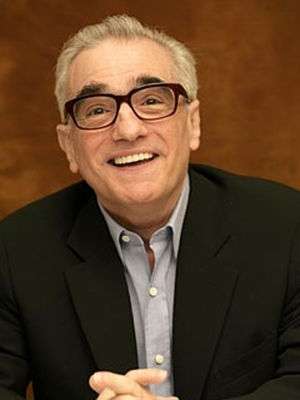Martin Scorsese
| IMPORTANT: The content of this page is outdated. If you have checked or updated this page and found the content to be suitable, please remove this notice. |
|---|

Beloved filmmaker, he is famous for his movies about organized crime in the United States. His early films quickly made him a critical favorite, culminating in Taxi Driver. This allowed him to make his big-budgeted dream project, New York, New York, which bombed. The '80s were an uneven period, with Raging Bull drawing from his struggles with kicking cocaine, and Gangs Of New York and The Last Temptation of Christ caught in Development Hell. The '90s saw the release of Goodfellas, often cited as his best movie, and Casino, a very similar (and almost similarly respected) film. Gangs of New York was finally released in 2002.
He uses many of the same actors in his movies, including Robert De Niro, Joe Pesci, Harvey Keitel, and Leonardo DiCaprio.
He is famous for not having won an Oscar for Best Picture or Best Director at the height of his popularity and critical recognition. He eventually won his Best Director Oscar for The Departed, which won three other Oscars including Best Picture, and immediately suffered Hype Backlash.
Well-known for his big bushy eyebrows, his physical stature[1] is inverse to his standing as a filmmaker.
- Who's That Knocking at My Door
- Boxcar Bertha
- Mean Streets
- Alice Doesn't Live Here Anymore
- Taxi Driver
- New York, New York
- Raging Bull
- The King of Comedy
- After Hours
- The Color of Money
- The Last Temptation of Christ
- Goodfellas
- Cape Fear
- The Age of Innocence
- Casino
- Kundun
- Bringing Out the Dead
- Gangs of New York
- The Aviator
- The Departed
- Shine a Light
- Shutter Island
- The Pilot of Boardwalk Empire
- Hugo
- Anti-Hero: The Byronic and the villainous show up a lot.
- Ax Crazy
- Big Applesauce: New York is a common setting for his works.
- Bittersweet Ending
- Black and Gray Morality
- Brooklyn Rage
- Christianity Is Catholic: Somewhat justified, in that the majority of characters in his best known films (i.e. the ones involving organised crime) tend to be Italian or Irish, two strongly Catholic ethnicities.
- Cluster F-Bomb: Casino, Goodfellas and The Departed.
- Damn, It Feels Good to Be a Gangster!: Deconstructed frequently, but Do Not Do This Cool Thing.
- Dyeing for Your Art: Raging Bull being the most prominent example; Daniel Day-Lewis also went above and beyond for his part in Gangs of New York.
- Gallows Humor
- Glory Days
- Hair-Trigger Temper
- Jerkass
- Jerk with a Heart of Gold
- Laser-Guided Karma: His gangster films usually end badly for the criminals.
- The Mafia: He's created the most iconic Mafia films outside of The Godfather
- Missing Episode: Who's that Knocking At My Door was supposed to be the second installment of a trilogy of films based around the idea of crime and Catholic guilt. Mean Streets was the third part. The first part, Jerusalem, Jerusalem, would have involved the Harvey Keitel character going to a seminary retreat and would have been based around symbolism from the stages of the cross. No studio would fund it due to its overtly religious nature.
- New York City
- No-Holds-Barred Beatdown
- Nothing but Hits: An example of the trope at it's finest; Scorsese's movies possess some of the best soundtracks ever.
- One of Us: While most of today's filmmakers operate with an "out with the old, in with the new" mentality, Scorsese is president of The Film Foundation, which is dedicated to the preservation of film (including the very obscure, very old ones). For this passion alone he is adored by many a fan of silent film and classics alike.
- During his childhood he would constantly borrow a certain book from the New York Public Library featuring photos from various films up to 1950, and a few times succumbed to the temptation to clip a picture out.
- Pigeonholed Director: Scorsese has constantly experimented with different genres, but gangster dramas are clearly his bread-and-butter.
- Well he's Playing Against Type with Hugo, a straight forward Family film with fantasy elements.
- Redemption Quest
- Rockumentary: The Last Waltz (1978) is about The Band's farewell concert in 1976, while Shine A Light (2008) captures The Rolling Stones in concert in 2006.
- Early in his career, Scorsese was assistant director and editor for the Woodstock film.
- So My Kids Can Watch: He's said he made Hugo so he'd have at least one film his daughter could see.
- Soundtrack Dissonance: Lots of oldies and classic rock. Lampshaded in Mean Streets.
- Scorsese excels at mixing songs to the appropriate scene. Goodfellas is the perfect example.
- Trigger Happy
- Usage of Rolling Stones 'Gimme Shelter as a Signature Song, usually as a subtle premonitory sign
- Villain Protagonist: The main characters in most of his films are not nice people.
- ↑ at 5'4", in the Hugo premiere pictures he's shorter than a still-prepubescent Asa Butterfield